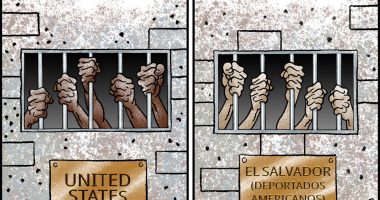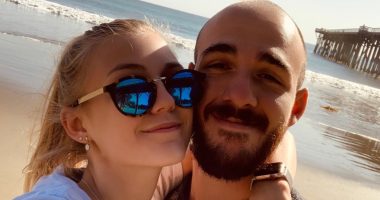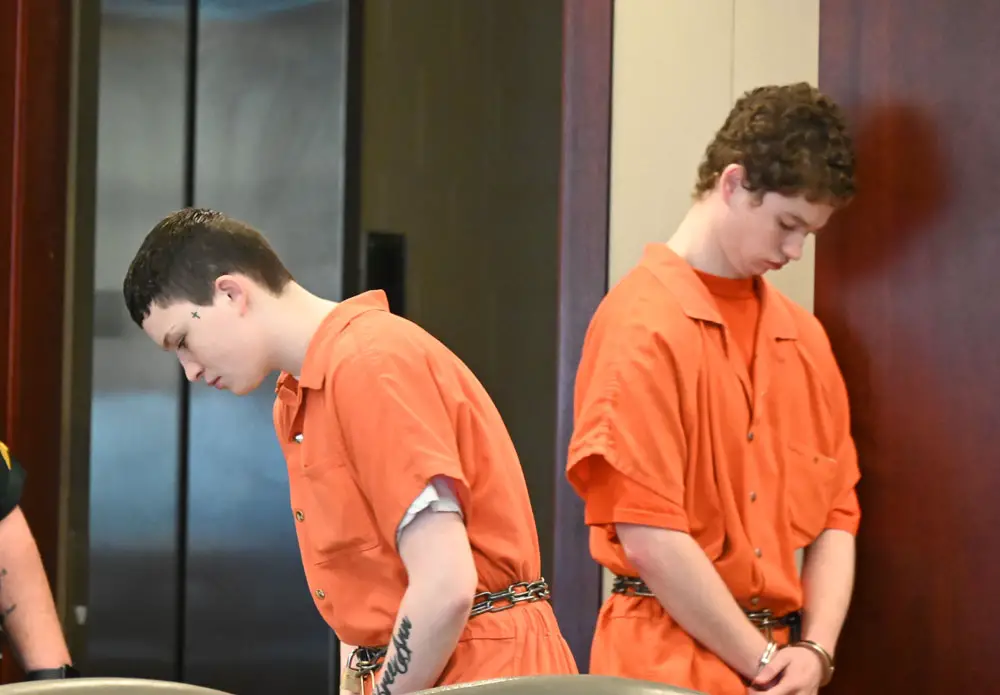
Gabriella Alo, the 19-year-old Palm Coast woman at the center of a pair of seemingly sadistic assaults in Flagler Beach last January–assaults captured on videos and that galvanized the local community around one of the victims–was sentenced to 6 years in prison followed by nine years on probation today.
She will also have to follow a series of conditions and restrictions. The sentence is significantly lower than that sought by the state, but was compelled by mental health issues, the judge said, and “some elements of sincere remorse demonstrated here on the witness stand.”
Alo’s brother, Nicholas, 22, who was involved in one of the assaults and did not intervene to prevent the second, was sentenced to two years in prison, with credit for nearly a year he’s served, followed by three years on probation.
The bottom of the sentencing guidelines for Gabriella was 9.3 years. The prosecutor was recommending 15 years in prison and 15 years on probation.
The sentences were, all told, a victory for the defense, relative to the steepness of the potential punishments, and the public pressure the case had generated. Between the credit for time already served and “gain time,” or early release, Gabriella will be out of prison in a little over four years, while her brother may be released by the next Thanksgiving.
“It’s been a difficult case from the start,” Circuit Judge Terence Perkins said, acknowledging how the case reflected a confrontation between someone who did everything right–the victim, Kaitlin Dahme–and someone who did everything wrong–Gabriella Alo–but who, like her brother, had a harrowing life up to that point.
Both Alo siblings have been at the Flagler County jail since the January 13 incidents at Wickline Park. Both have accumulated numerous disciplinary issues at the jail, and for Nicholas, additional charges stemming from assaults against other inmates. Nicholas also faced a probation violation in Volusia County. The sentences addressed the totality of the cases.
The Wickline Park incidents, parts of them documented with video by the Alo siblings on their own phones as they laughed and jeered, started when, in a scene as if from “A Clockwork Orange,” they brutalized a juvenile, taunting, humiliating, punching, and repeatedly kicking him, then chasing him down to where he’d sought refuge on a set of stairs. There they again kicked him and stomped on him as he attempted to shield himself with his hands. The Alos were full of hilarity as they punched and kicked, and ordered the boy to apologize.
Nicholas was on probation for child abuse at the time: he had driven to a 12-year-old girl’s place to have sex with her, ostensibly unaware she was that young, and found in a closet with nothing but his underwear on.
It was during that second part of the assault against the boy at Wickline Park that Lisa Dahme was dropping off her daughter, Kaitlin Dahme, across the street from the park.
“All of a sudden I heard terrible screams, like someone was getting beat. I didn’t even think before I was across the road–what is going on over here?” Kaitlin recalled thinking. She testified about it today as the Alo siblings sat on separate tables diagonally from the witness stand.
At first Kaitlin thought maybe her brother was involved, because she’d mistaken the Alos’ white car for his, but that was for a matter of instants. Hearing her yells, the Alos and others scattered. The Alos got in the car.
Kaitlin tried to get the Alo vehicle’s license plate number as it backed up. “I saw her put the car in reverse,” Kaitlin said. “I still didn’t think that someone would actually run me over.” But Alo did. The car “like whipped out so fast, and it’s like my feet got sucked up in and around the tire,” she said. She was yelling and screaming to get the car off of her.
The passenger backseat door was open, and when the car ran over her again, she was struck in the head by the open door. Alo crushed her left ankle with the second move of the car. Had Alo stopped after first running her over, she said she would have escaped injuries.
Assistant State Attorney Tara Libby was eliciting that testimony from Kaitlin when, in an unusual intervention, Perkins held up a flash drive of the video of the car running over Kaitlin, and suggested to Libby to play the video. She did.
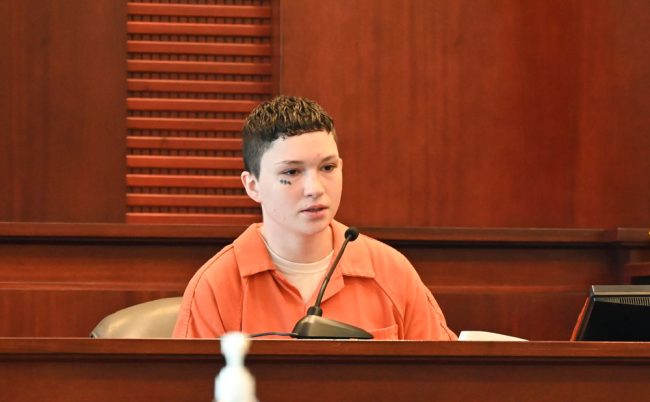
The silent footage drew gasps from the more than two dozen people in the gallery who’d turned up in support of Kaitlin, or because they were involved in the case. Flagler Beach Police Chief Matt Doughney, whose officers investigated the case, was also in the gallery. Flagler Beach police victim advocates sat with Kaitlin when she was not on the witness stand. At least another two dozen were following by zoom–an indication of the extent to which the case has consumed the community, and likely affected at least to some extent the manner in which it has unfolded in court.
“If I could go back and changed what happened that night, I would,” Gabriella Alo said after taking the stand today, the first time she has spoken publicly since the attack. She said she understood that her words would “fall flat,” but addressing Kaitlin, she said she did not know her and never intended to inflict pain on her, or on her mother. “She shouldn’t have had to witness that, and I’m really sorry. I can’t take it back, but if I could take it back, I definitely would,” she said, crying. “I want to make better decisions in the future.” She said she felt for Kaitlin “personally,” having had her own similar struggles (Alo had been in similar car incident when younger).
She did not minimize the gravity of what she’d done, only her intentions as she did it. “I’m not a fighter, I’m more of a lover,” she said, words certain to sound jarring when juxtaposed with the violence she displayed on video she herself took.
“What about all those phone calls where you were laughing about what happened?” Libby asked her, referring to jail calls. Alo said she was laughing in a disbelieving way, niot because any of this was funny. Libby then asked her about her laughter as she brutalized the young boy. “I honestly felt they were just horse-playing,” she said.
“And then after that, you tell your brother and the other two individuals to tag team and start beating up” the young man, Libby said.
Alo claimed she was not going to let the boy be beaten by two people at the same time, essentially saying that tag-teaming the beating was more fair. Nor was it the first time that Alo had beaten up another person, Libby reminded her.
Nicholas described his acts as “those of an idiotic child,” blaming them on not taking his medication–and, repeatedly, blaming them on his younger sister.
His testimony–reading a letter from the stand–focused almost entirely on portraying himself as a victim of a difficult childhood, health issues, poor decisions, as a victim of molestation by an uncle for “half my third grade year,” as the victim of mental disability, of getting beaten up in school, and as one who’d attempted suicide while getting bullied by classmates.
Read Related Also: Candidate For George Santos' Open House Seat Is Convicted In Jan. 6 Riot
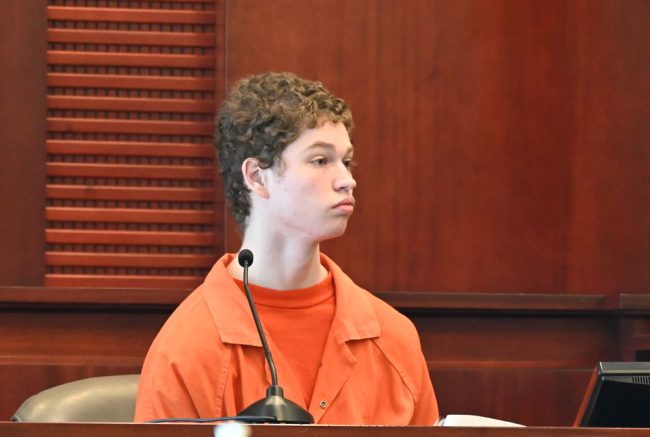
“Please your honor, give me a chance to be like everyone else,” he told the judge, crying about missing his grandmother’s funeral after her Feb. 4 death. He also complained about his treatment in jail, detailing “hurtful” interactions with deputies and enumerating all the harms he says he’s sustained there. The judge had to stop him, since the statement he was reading from the letter was not related to the incident in play.
“At the end I apologize,” Nicholas said as the judge took the letter and placed it in evidence. He called the videos “disturbing,” and insisted several times that he had faked or tried to fake hitting his victim, because he had nothing against him. He described himself as afraid of his sister at the time. “Yes, I have been afraid of her,” he said, but not now, not with deputies around him. Nevertheless, he conceded that when they were younger, he broke her nose.
Today’s sentencing hearing was unusual in the sense that both Alo siblings were sentenced at the same time. Gabriella was represented by Assistant Public Defender Regina Nunnally. Nicholas was represented by Raven Sword, a private attorney appointed by the court through the Office of Criminal Conflict and Civil Regional Counsel, since the public defender’s office could not represent both siblings. So the lawyers took turns questioning the witnesses.
Gabriella faced a first degree felony charge of tampering with a witness, a second degree felony charge of leaving the scene of an accident with a crash, a second degree felony charge of aggravated battery with a deadly weapon, and a third degree felony charge of child abuse.
As Libby in her final arguments to the judge described phone cals from jail, Gabriella bragged about being in the news, laughed off the incidents, and worried about who was going to take care of her cats. Perkins challenged Libby several times about her interpretation of the evidence, or the relevance of her arguments to the specific charges.
In some instances, Perkins had to clarify Libby’s arguments for her, as when he said that he could accept Gabriella’s testimony as evidence about the aggravated battery. She said Gabriella has been “nothing but disrespectful” to jail deputies, and anything less than the minimum recommendation would be “an injustice.”
Nunnally in her closing went to some lengths to describe how despondent Gabriella got in jail after hearing how she was being vilified on social media and in comments about articles on the incident. “Why do I care?” the judge asked her, looking for the argument to be focused on the charges, not on what happened in jail afterward.
So Nunnally spoke of the “disruptive childhood” Gabriella had endured, through no fault of hers. “She was trying to be an adult, but she’s still dealing with child-like situations,” Nunnally argued, describing the incident as “isolated,” not part of a pattern–and that she was never an intentional threat to the victim: in essence, she was not aware that she had run over Kaitlin. The video shows the car swerving, trying to go around Kaitlin, Nunnally said.
“This does not warrant 15 years,” Nunnally said. “This really was an accident.” Nine years is too much, she added. As for her brother pointing the finger at her, “him blaming everything on her is a scapegoat,” she said of Nicholas.
She recommended going below the guidelines–all the way to house arrest, or, if prison was sought, six years in prison, by sentencing Gabriella under youthful offender guidelines. Libby called the youthful offender sentence as “not appropriate,” though she agrees that Gabriella qualifies as a youthful offender.
Perkins termed a youthful offenders sentence “completely inappropriate.”
Nicholas faced a second degree felony charge of tampering with a witness or a victim in a felony proceeding, a third degree felony child abuse charge, two felony battery charges.
Sword said it was very clear that Nicholas had a “very difficult life so far,” listed a number of issues as a consequence of a lack of treatment, and recommended a significantly reduced incarceration, if not accepting the year he’s already served as sufficient, and impose a more “extended” probationary sentence, with requirements for treatment. “I think if we want to consider what’s truly at the heart of this issue, it’s his mental health,” Sword said.
For Nicholas, Libby was recommending five years in prison consecutive to the year he’s spent in jail, and 10 years on probation for. “He doesn’t do anything to help,” she says. “Actions speak louder than words, and I would argue that Mr. Alo’s actions and inactions on the night of this incident are very important.”
As in many sentencing hearings where the defendants are tendering an open plea–meaning that it’s up to the judge to set the sentence, as opposed to the judge ratifying an agreed-upon sentence negotiated between the lawyers–the testimony was intended to sway Perkins one way or the other: the prosecution sought a lot of prison time, the defense sought the opposite.
The witnesses also included Kaitlin’s mother, the Alo siblings’s mother, and two psychologists, summoned by each of the defense attorneys on behalf of each of the Alo siblings. The psychologists described an unhappy childhood for Gabriella and Nicholas: foster homes, sexual, physical and emotional abuse–Nunnally in a motion to the court describes Gabriella as having been sexually abused by her father, Sword said Nicholas was abused by an uncle. When Gabriella came out as a lesbian, “she didn’t have a lot of support on either side for that,” one of the psychologists said. (Lack of parental or community support for young people’s sexual identity is a common aggravator of negative behavior, depression and suicidal tendencies.)
One psychologist described Gabriella as having had 764 tantrum and other behavioral incidents in a single quarter at school. Both were described as having behavioral disorders. Both described them as having an inability to control themselves past certain triggers, including a bipolar disorder for Nicholas and depression for Gabriella. Both had been through the juvenile justice system, both repeatedly so. Both had been medicated since they were very young, though neither has had sustained therapy or counseling.
Perkins is never deaf to mitigating factors. But nor is he to the impact of crimes on victims, and the ripples of consequences those crimes cause long after the incident.
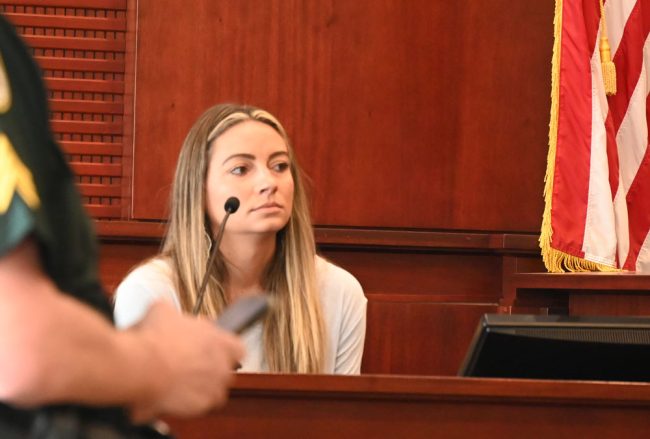
The incident had left Kaitlin with a triple fracture in her left ankle–the inner ankle bone and the outer ankle bone were completely crushed, and the length of the ankle was shattered, requiring complete reconstructive surgery. She now has two plates, 20 screws and two wires in the ankle. She was not able to walk for four months, and only then was allowed to start physical therapy. She could not even stand to shower.
“You don’t realize how lucky you are to have two feet and how much you actually, you know rely on your feet everywhere you go,” Kaitlin said, describing the experience as humiliating: she had to ask for help for the slightest needs. “I’m affected by these injuries every single day, unfortunately, and it’s something that I’m still learning to live with.”
Kaitlin’s mother had described those consequences in her testimony, struggling through tears. It was, she said, “one of the worst nights of my life,” a night when “I was not able to protect my baby girl.” She was calling 911 as Alo drove the car over her daughter’s ankle. She had no idea how extensive the injuries were and feared they could be life-threatening. She watched her daughter sob in pain for four days in the hospital. “My daughter went from being a strong, active independent young woman that rarely asked others for help to a young woman who’s physically unable to do anything on her own,” she said. That lasted for several months.
“Thankfully, we live in a great community and friends, co-workers and family were more than willing to step up and help whenever and however they could,” Kaitlin’s mother said: that was evident from the number of people in the gallery. A local salon had gone as far as styling Kaitlin’s hair periodically, when she was incapacitated. “We couldn’t have gotten through this without everybody and I’m so thankful for everybody’s loving support, and I’m so proud of my daughter’s strength and determination she showed us last year.”



